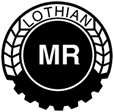
Lothian Machinery Ring
Machinery Ring Information
- How can the Machinery Ring help me?
- Why the Machinery Ring?
- Who is eligible to join the Ring?
- How does the Machinery Ring operate?
- Are the rings a new concept?
- Who owns, operates and pays for repairs?
- What is the cost?
- Do I need to live locally?
How can the Machinery Ring help me?
Machinery costs are the most important fixed cost on most farms. Small savings can
have a big effect on profits. The Machinery Ring matches a surplus machinery
capacity on some farms with a shortage on other farms. This form of “organised
contracting” increases the work for some of the men and machines during a season. It
reduces the major costs of machine ownership - interest and depreciation - per acre/per
hour. More efficient use of machinery enables farmer or contractor suppliers to earn
extra income from using their machinery on demander member farms. Demanders do
not have the ownership costs associated with the range of machinery they require.
Total power costs for Ring members are reduced improving the farm profitability for
both suppliers and demanders. back
Why the Machinery Ring?
• You have the opportunity through the Ring to be a supplier of some operations
(earning extra income) and a demander for others.
• You can ask which member you would like to undertake the work enabling
established contracts to be maintained.
• There will invariably be back-up or replacement through the Ring which can be
brought in, in the event of a major breakdown or delay with the original
supplier. This guarantees timeliness and continuity - important considerations
when relinquishing ownership.
• Peak seasonal demands for men or machinery can be met by the Ring allowing
a minimum core labour and machinery compliment to be owned for the remainder of the year.
• New machinery can be brought in by some members and the benefits of better
timeliness, quality or a cheaper system can be spread on to other members’
farms who hire these machines with the experienced operator. back
Who is eligible to join the Ring?
Farmers, contractors, self-employed labour, service businesses. You don’t have to
indicate whether you will be a supplier or a demander since this may change over time
and with experience. back
How does the Machinery Ring operate?
The Ring Manager is the appointed organiser and members’ contact point. His job is to
match requirements with services available, hopefully well in advance of when jobs
need done, although emergency needs can also be met. He has knowledge of which members have what machines available as potential
suppliers. The demander phones the Manager and asks for the particular service, when
he needs it and if he has a preference for who undertakes the work. The structure of the Ring is cooperative with share capital from members. back
Are the rings a new concept?
No. They have been established in mainland Europe for 30 years - and not mainly due
to smaller farms. They were born in financially difficult times and have progressively
prospered and diversified. In Holland, for example, one ring has over 1,000 members covering an area equivalent
to a county. Investment has been made in sophisticated potato and forage equipment to meet the
needs of the area and enterprises. Members range from the largest to the smallest
farmers and include contractors. back
Who owns, operates and pays for repairs?
Although the Machinery Ring is a cooperative business, the machinery is owned by the individual. He has to
finance, maintain, operate and repair it. Machinery is usually available with an operator. back
What is the cost?
You pay £50 share capital and an annual subscription. Work undertaken through the
Ring is charged at the agreed rates with a 2% commission applied to both supplier and
demander to cover administration costs. The commission for commodities is normally
only deducted from the supplier.
Payment is by direct debit 21 days after receiving the completed worksheet from the
supplier. back
Do I need to live locally?
No. Although the Ring Manager may be some distance away, he will have members
who are in your Parish. If you need services he will usually use a local supplier to
minimise travel time and cost. Since most contact is by phone, distance is not a
disadvantage. back